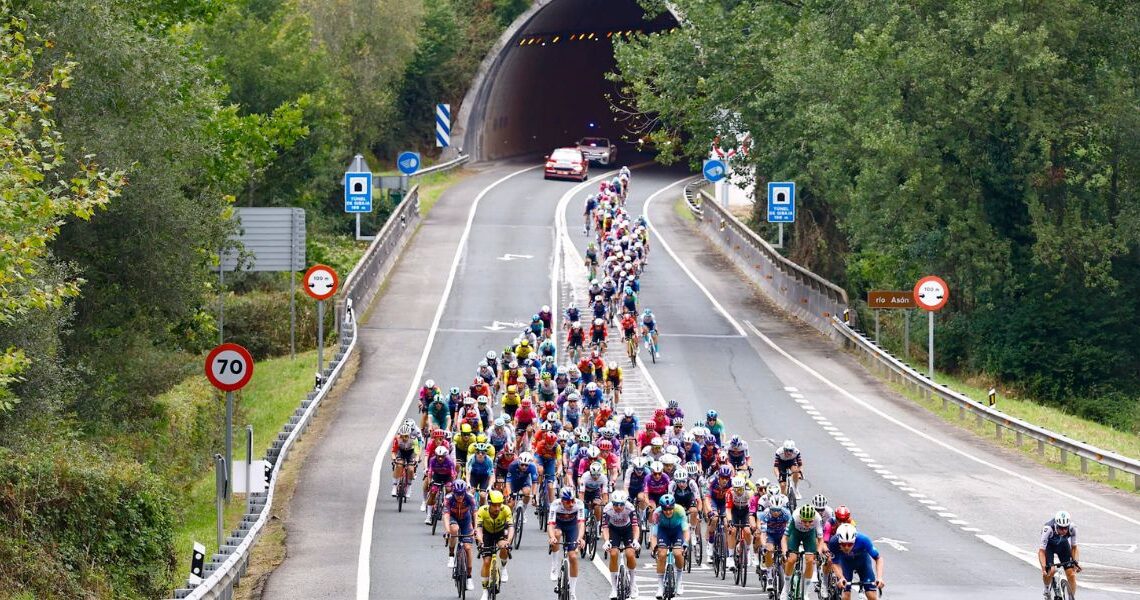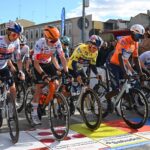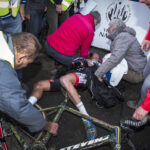
 Conditions were quite peaceful before the stage.
Conditions were quite peaceful before the stage.
All the drama on today’s Vuelta stage happily took place on the road rather than off: Pro-Palestinian protests were visible but peaceful and unobtrusive, and while Juan Ayuso was central to today’s developments, his riding was the focus rather than his employment.
 Ayuso was all smiles after the stage.
Ayuso was all smiles after the stage.
Mostly. In an interview after the stage the Spanish rider, whose days with UAE Team Emirates are officially numbers, essentially said, “It wasn’t my idea” to pass the bulk of the pacemaking to his stage co-leader, Javier Romo. Perhaps the interview was an audition: After all, Romo’s Movistar Team is the leading candidate to be Ayuso’s next team.
The on-road drama didn’t unfold only on the final climb, with the two Spaniards fending off chasers; the route was packed with climbing (nearly 2,600 m of accumulated ascent across two hefty KOMs), and the day was packed with break-making attacks: It was all gas from the flag drop, with riders testing their legs and each other.
At one point the break was large enough — up to 50 riders — that it spawned its own breaks. Riders including Brieuc Rolland (who’s been riding aggressive all week), Victor Campenaerts (allowed, for once, to break free of his Vingegaard-guarding), and Mads Pedersen were especially aggressive; their activity didn’t pay off in a stage win, but they kept the race interesting, and did earn top-five placings — Pedersen after earning max points on the intermediate sprint, falling off on the day’s second big climb, and rallying back to the chase group…Remarkable tenacity.
 Campy was allowed to go in the break today.
Campy was allowed to go in the break today.
 Otherwise, Visma and Vingegaard kept quiet today.
Otherwise, Visma and Vingegaard kept quiet today.
Ayuso had lit the touch paper alone on the first climb, but on the second categorized ascent he received a leadout from Marc Soler; perhaps we’re seeing Iberian rivalry at work, as Soler better supports fellow Spaniard Ayuso than Portuguese team leader Almeida? Either way, Ayuso took advantage of the leadout by driving the pace up the entire climb, with Romo in tow; after cresting, the pace-driving burden shifted, and for a moment it appeared that Ayuso’s blasé approach might allow the chasing Rolland to catch the leading duo, but Ayuso and Romo stayed away, the former riding powerfully away from the latter in the closing meters.
 Romo was evidently disappointed to be outsprinted by Ayuso.
Romo was evidently disappointed to be outsprinted by Ayuso.
Off the road, the residual tension from yesterday’s protests in Bilbao still pulsed through the race. Israel-Premier Tech reaffirmed its stand to stay in the Vuelta, calling withdrawal a “dangerous precedent”—emphasizing support for peaceful protest, so long as safety wasn’t compromised. The UCI and Vuelta organizers continue to walk the tightrope of security, politics, and professional sport.
 Protests were visible and active, but didn’t impede the riders.
Protests were visible and active, but didn’t impede the riders.
Stage 12, then, represented a partial return to normalcy — “partial” because in this Vuelta, “normal” typically means ending the stage with a monstrous final climb. Let’s hope that tomorrow we see a full return to normalcy: tranquilo away from the peloton, and exciting racing among the GC favorites up the Angliru.
 Tranquilo.
Tranquilo.
Stage 13 Profile
Stage and GC Top Ten, from procyclingstats.com.
Stage Top Ten
GC Top Ten
The post Vuelta’25 St.12: High Drama on the Road, Low Drama off as Ayuso Takes Second Stage Win appeared first on PezCycling News.




